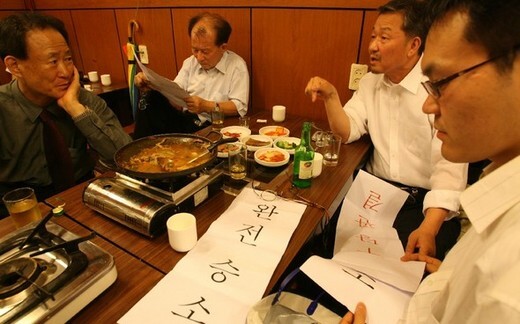hankyoreh
Links to other country sites 다른 나라 사이트 링크
NEC advocates voting rights for overseas Koreans

The National Election Commission is trying to allow Korean citizens in foreign countries like Japan and the United States vote in domestic Korean elections.
An estimated three million Korean citizens are believed to live outside the country.
The NEC has submitted an official opinion to the National Assembly suggesting a revision to voting laws so as to allow for voting at overseas locations or voting by mail. Polling places would be set up in Korean diplomatic missions overseas for permanent overseas residents and other citizens outside the country during an election, and persons too far from a diplomatic mission would be allowed vote by mail-in ballot.
In National Assembly elections people would vote using their registered current address (jumin deungnok ji) or, if they no longer have a legally registered current domestic address, would vote in the National Assembly district where their permanent legal address (bonjeok) is located. Overseas voters would not, however, be able to vote in elections for local office and in National Assembly by-elections.
Korea’s approximately 10,000 crew members on ocean-going fishing vessels would be able to vote by facsimile machine.
The Constitutional Court declared the law preventing overseas Koreans and ship staff from voting in Korea’s elections “inconsistent” with the Constitution in June 2007. It ordered that the law should be revised before the end of this year.
According to the NEC, 2.4 million of the three million overseas Korean citizens are eligible to vote, and the results of an NEC survey indicated that 1.34 million would vote if given the opportunity. The number is enough to change the election landscape. The presidential election of 1997 was decided by a difference of only 390,000 votes and the presidential election of 2002 was won with a difference of 570,000.
The NEC also wants to have implemented a requirement that potential candidates place trust money with the commission, in order to prevent indiscriminate numbers of people from running for the same office.
In addition, in its official recommendation to the National Assembly, the NEC also proposed that meetings of alumni associations and “hometown associations” (hyanguhoe), or clubs of people away from their home regions, be permitted during the official election period as long as they do not influence the election and to allow for online campaigning at any time. Finally, it wants to see that ethnic Koreans with foreign citizenship and foreign citizens married to Korean nationals and who live in the country be allowed to vote in elections for local office.
“By-elections cannot be held next year unless this law is revised by the end of 2008 because the section of the law at issue loses its validity as of January 1,” said the NEC in a statement. “Restricting the right of ship workers to participate in elections was also declared inconsistent with the Constitution, so an amendment must be passed during this current ordinary National Assembly session.”
Please direct questions or comments to [englishhani@hani.co.kr]
Editorial・opinion
![[Column] Season 2 of special prosecutor probe may be coming to Korea soon [Column] Season 2 of special prosecutor probe may be coming to Korea soon](https://flexible.img.hani.co.kr/flexible/normal/500/300/imgdb/original/2024/0426/3317141030699447.jpg) [Column] Season 2 of special prosecutor probe may be coming to Korea soon
[Column] Season 2 of special prosecutor probe may be coming to Korea soon![[Column] Park Geun-hye déjà vu in Yoon Suk-yeol [Column] Park Geun-hye déjà vu in Yoon Suk-yeol](https://flexible.img.hani.co.kr/flexible/normal/500/300/imgdb/original/2024/0424/651713945113788.jpg) [Column] Park Geun-hye déjà vu in Yoon Suk-yeol
[Column] Park Geun-hye déjà vu in Yoon Suk-yeol- [Editorial] New weight of N. Korea’s nuclear threats makes dialogue all the more urgent
- [Guest essay] The real reason Korea’s new right wants to dub Rhee a founding father
- [Column] ‘Choson’: Is it time we start referring to N. Korea in its own terms?
- [Editorial] Japan’s rewriting of history with Korea has gone too far
- [Column] The president’s questionable capacity for dialogue
- [Column] Are chaebol firms just pizza pies for families to divvy up as they please?
- [Column] Has Korea, too, crossed the Rubicon on China?
- [Correspondent’s column] In Japan’s alliance with US, echoes of its past alliances with UK
Most viewed articles
- 1‘We must say no’: Seoul defense chief on Korean, USFK involvement in hypothetical Taiwan crisis
- 2[Column] Season 2 of special prosecutor probe may be coming to Korea soon
- 3N. Korean delegation’s trip to Iran shows how Pyongyang is leveraging ties with Moscow
- 4Korea sees more deaths than births for 52nd consecutive month in February
- 5Amnesty notes ‘erosion’ of freedom of expression in Korea in annual human rights report
- 6[Reportage] On US campuses, student risk arrest as they call for divestment from Israel
- 7[Editorial] New weight of N. Korea’s nuclear threats makes dialogue all the more urgent
- 8‘Weddingflation’ breaks the bank for Korean couples-to-be
- 9[Column] Has Korea, too, crossed the Rubicon on China?
- 10[Column] Park Geun-hye déjà vu in Yoon Suk-yeol